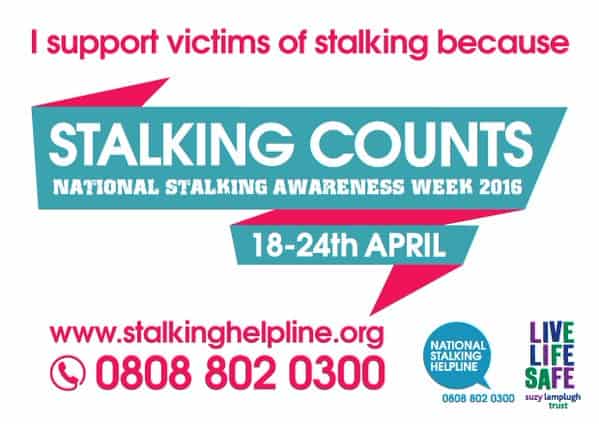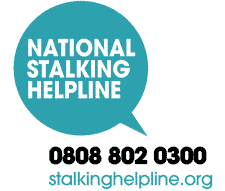18th – 24th April Stalking Awareness Week By Surrie Fullard
To mark National Stalking Awareness Week 2016 I thought I’d write a quick post to raise more awareness of this sensitive issue. It is thought that only a very small proportion of stalking cases are actually reported to police in the first instance – which leads me to believe victims require more support instead of being blamed for what they are currently experiencing and the police need more training on how to recognise stalking. It also has to be treated as a priority crime.
There were 7,706 cases of stalking between 1 April 2013 – 4 February 2016 recorded by all police forces in England and Wales (Freedom of Information). But, 4.9% of women and 2.4% of men ages 16-59 (1.1 million people) claimed to have experienced stalking within a year (British Crime Survey 2015).
In November 2012, two criminal offences relating to stalking were announced. Stalking is defined as two or more incidents that caused distress or alarm of receiving obscene or threatening letters, emails, text messages or phone calls; having obscene or threatening information placed on the internet; waiting or loitering around home or workplace; or following or watching by any person, including a partner or family member.
Research suggests that 30-40% of stalking cases involve physical violence. Most stalkers are known to their victims, with strangers making up only 10% of stalkers. A stalker is most likely to be a victim’s former partner, family member, colleague or acquaintance.
For further information and support, please contact;
The National Stalking Helpline on 08088020300 from 9:30am – 4pm (except Wednesday 13:00 – 16:00) or email advice@stalkinghelpline.org. (Website: www.stalkinghelpline.org)
Paladin Service on 07721757071 or email info@paladinservice.co.uk (Website: www.paladinservice.co.uk)
If you are in immediate danger, please call 999.
Useful Resources
www.voice4victims.co.uk Twitter: @voice4victims
www.digital-trust.org Twitter: @Digital_Trust_

Comments are closed.